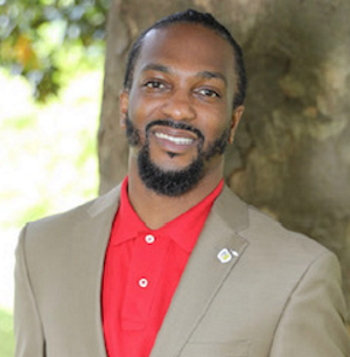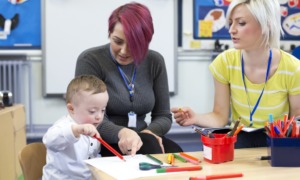 INSTA-PHOTOS/SHUTTERSTOCK
INSTA-PHOTOS/SHUTTERSTOCK
Learners whom I prefer to call exceptional, rather than disabled, get teased more often than many of us care to acknowledge. They include students with deficits that can be intellectual, developmental, behavioral or emotional. But they often are not perceived as disabled because their disability isn’t an obvious physical one.
The distance learning that the COVID-19 pandemic forced upon most all the nation’s schools made it even more apparent that schools aren’t protecting, in particular, Black and brown exceptional learners. They are the bulk of the students I support at 7 Pillars Career Academy in the Atlanta area. They’re the reason I’m pursuing a master’s degree in special education, believing it will fortify me as a classroom instructor and nurturer, but also as an advocate.
 Here’s what I know, for sure: Just as students and parents have adjusted to new norms of learning, so have special education teachers, though we’ve not benefited from having fully equipped co-teachers and paraprofessionals who are greatly needed to help bolster special education students and their learning. During this summer break, before fall’s re-opening, it’s imperative that school districts consider the amount of time it will take to properly train teachers, co-teachers and paraprofessionals in an array of methods that will help them ably instruct all children.
Here’s what I know, for sure: Just as students and parents have adjusted to new norms of learning, so have special education teachers, though we’ve not benefited from having fully equipped co-teachers and paraprofessionals who are greatly needed to help bolster special education students and their learning. During this summer break, before fall’s re-opening, it’s imperative that school districts consider the amount of time it will take to properly train teachers, co-teachers and paraprofessionals in an array of methods that will help them ably instruct all children.
The digital learning experience has shown that changes are essential in other areas of teaching, too. For example, students who may have a chronic illness may be better served by spending half of the school day in an actual classroom and the other half in a virtual classroom.
Other exceptional learners need course offerings to help hone their skills at interacting socially with others. Recess, which has been declining for decades, is a great forum for building relationships and meeting some of the social and emotional goals of exceptional learners. In light of that, there will be grave challenges for exceptional learners, who’ve adjusted to remote learning, if they’re forced to revert back to sitting in a classroom all day long.
Parents need resources to help at home
As we return to in-person classes, it’s also important to keep in mind that many parents of exceptional learners need resources to help a child without sufficient skills at, as examples, sight-reading when called upon to do so or remembering a mathematical formula during the wee bit of time it takes to move from one class to the next. That kind of confusion and anxiety can result in temper tantrums, other aggressions or even self-isolation on the child’s part.

Courtesy Jason B. allen
Special education teacher and advocate Jason B. Allen, a 15-year classroom veteran, directs the EdLanta Student Coalition, where he also blogs about education issues.
Before and during the pandemic, many parents didn’t have those resources, including mental health counseling, to fully understand what kinds of academic challenges would trigger a child’s outburst or seclusion. Many parents watched, helplessly, as their children grew frustrated with classroom workloads that overwhelmed them; with lack of internet access that prevented them from getting classroom assignments; and with sleeplessness brought on by having what had been their regular study, homework and practice routines completely upended during remote learning.
Many of these very same students are advocating for themselves and for what they believe they need in a post-pandemic world. My students in the EdLanta Student Coalition, comprising 5th- through 12th-grade activists, have joined organizations in the Brightbeam network of education reformers and advocates who are urging the Biden Administration to revive the U.S. Department of Education’s office of civil rights, requiring it to focus, in particular, on educational equity and parity for exceptional learners.
One of those members of EdLanta, Aisha Dukuly, has written several articles on the inequities she’s seeing in her Gwinnett County, Ga. school district. At one point, she was afraid to go back to school because she feared the schools were not sanitized properly before or during COVID-19. “As a student with severe health conditions, many of our school leaders don’t even know [if] the building’s infrastructure is safe for us to return to school as usual.” Those were the words Aisha, who has sickle-cell anemia, shared with the EdLanta Student Coalition and in commentary on EdLanta’s blog, advocating for students with severe health conditions. She has helped create surveys, lead marches and host virtual forums on EdLanta to address students’ concerns about overcrowded classrooms and lack of sufficient educational resources for online learning.
Some teachers maliciously target special ed students
Another reason that many students are reluctant to return is that special education students often are targeted maliciously and without merit, including by teachers who aren’t highly trained in best practices for instructing these students or who simply are not adept at managing a classroom. These are the teachers who are most apt to send a student to the principal’s office for petty behaviors such as talking too much in class, chewing gum or preferring to kneel or stand up to learn. (Researchers have been studying whether standing classroom desks, versus sedentary desks, improve cognitive and other learning capacity.)
We’ve got to fine-tune and make fairer policies around discipline and behavior in public schools. Part of that work involves ensuring that the U.S.Department of Education holds states fully accountable for implementing and monitoring provisions of the Individuals with Disabilities Education Act, especially regarding access to distance learning and the digital equipment needed to learn remotely. Additionally, many parents need training on how to use those devices.
Another first step to improving accountability is to ensure that an exceptional learner’s individualized education program is accurate; reflects the appropriate learning resources that a child needs; and includes resources to help that child continue learning at home. These resources should include literacy tutoring and related support that the child’s family might also need.
Aiming to ensure students’ overall wellness and their future
Exceptional learners also need exposure to apprenticeships and other experiences in job sectors that are accommodating people with a range of abilities and disabilities. And they need to be able to enroll in such extracurriculars as leadership development, yoga or other small-group classes. I implemented those kinds of programs when, as dean of school culture at Latin College Prep (now known as The Rise Schools) in East Point, Ga., I saw a growing number of our exceptional learners misbehaving in class.
As they move into the future, we’ve got to ensure an optimum wellness for exceptional learners, including those who have severe health conditions. In Georgia, for example, an estimated 9% of young people have asthma, and an untold number of students are suspected of having asthma but simply haven’t been diagnosed. Disproportionately, they are youth of color. However, school districts don’t conduct audits of whether schools have individualized health plans.
For more on youth-related programs, research and resources, go to
► Youth Today’s OST Hub
Additionally, public schools should review every school to ensure that any improvements to infrastructure include updates of ventilation, water fountains and restrooms. U.S. Sen. John Ossoff, of Georgia, listened to public school students while on the campaign trail. My students and I joined with others across the state to write letters and raise awareness about schools that still have toxic, lead-containing water pipes and other plumbing. Ossoff added a provision to Congress’ recently approved “Drinking Water and Wastewater Infrastructure Act” that funds the remediation of lead pipes at public schools in Georgia and nationwide.
It’s a step in the right direction. Many more steps must be taken.
Special education teacher and advocate Jason B. Allen, a 15-year classroom veteran, directs the EdLanta Student Coalition, where he also blogs about education issues.





























